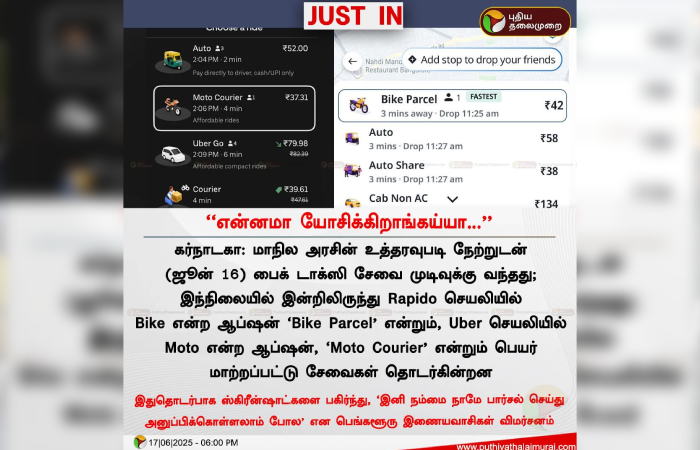How Rapido and Uber Pivoted Overnight After Karnataka’s Bike Taxi Ban
On June 16, the Karnataka government officially banned bike taxi services across the state.
This was a shocker for thousands of people who rely on Rapido and Uber Moto for quick, affordable daily commutes – especially students, office-goers, and gig workers.
Just when everyone thought, “Okay, that’s the end of cheap two-wheeler rides,” these apps surprised us with something unexpected…
From bike rides to parcels? Seriously?
- Rapido’s popular “Bike” ride option was renamed “Bike Parcel”
- Uber’s “Moto” ride became “Moto Courier”
Yes, you read that right.
They didn’t shut down operations. Instead, they just rebranded.
The app interface, pricing, even the riders — everything remains the same. The only difference? You’re no longer booking a ride for yourself, you’re supposedly booking to deliver a parcel.
But here’s the twist: many people are still riding as usual, except now they’re technically considered “packages.” Even riders are saying things like,
“Just say it’s a parcel delivery. I’ll drop you.”
Is it legal? That’s debatable. But it’s definitely creative.
Smart workaround or policy loophole?
Let’s be honest — this move feels like a clever hack to stay afloat after the ban.
Instead of shutting down, they tweaked the language. And just like that, they’re still in business.
But this also raises important questions:
- Is this bypassing government regulation?
- Are these companies prioritizing user needs or exploiting legal grey areas?
- What about rider safety, insurance, and liability in these "parcel rides"?
It’s a fine line between innovation and exploitation.
Confused users, concerned riders
This sudden shift has left everyone scratching their heads.
- Users don’t know if it’s safe or legal to book these “parcel rides.”
- Riders are unsure if they’re now delivery agents or unofficial chauffeurs.
- Authorities are figuring out how to respond — enforce stricter rules or accept this hybrid solution?
Meanwhile, social media is having a field day with memes and punchlines like:
“What a strategy! This isn’t a pivot, it’s a plot twist!”
What’s the road ahead?
Whether this tactic lasts or not, it highlights something bigger — the need for clear, updated urban mobility policies.
People want affordable, fast, and safe transport. Banning services without offering alternatives only hurts users and gig workers who depend on these platforms.
So here’s the real question:
Instead of banning, can we build better policies that balance innovation and regulation?
Let’s see if this “parcel ride” trend becomes the new normal — or just a temporary detour.




